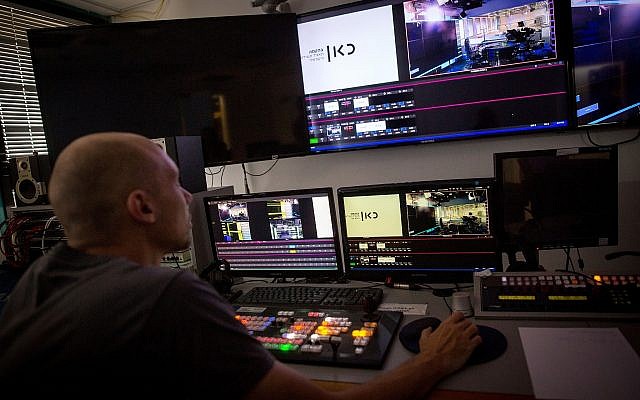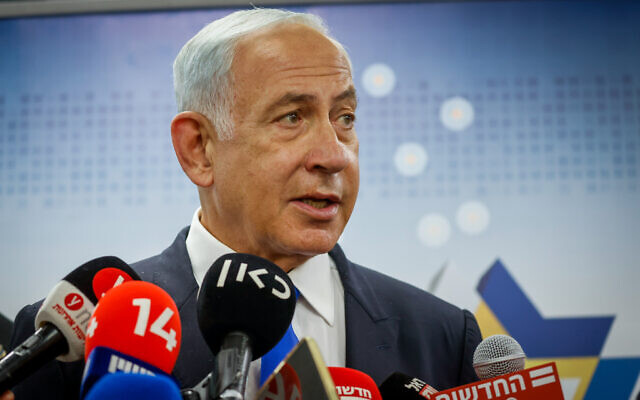The head of the Israel Press Council warned Tuesday of an expected attempt by the expected incoming right-religious government to impose limits on the freedom of the press.
“The Press Council will be forced to turn to the public and do everything in its power to thwart an expected attack on the freedom of the press and the media,” Hanan Melcer said during a conference at Reichman University.
The warning by Melcer, a former Supreme Court justice, followed a report that prime minister-designate Benjamin Netanyahu’s Likud party wants to shutter the news division of the Kan public broadcaster.
“Some believe that this trend is expected to be extended to other media as well,” Melcer said.
He pledged to fight any such effort.
Get The Times of Israel's Daily Edition by email and never miss our top stories
“If this is not officially denied as soon as possible, I hereby announce as the president of the Press Council that we will be forced to appeal to the public and do whatever we can within the framework of the law to thwart this anticipated attack on the freedom of the press and the media, the public’s right to know and our democratic resilience,” he said.

The control room at the offices of the Kan public broadcaster in Tel Aviv on August 29, 2016. (Miriam Alster/Flash90)
On Sunday, Channel 12 news reported that Likud is hoping to close down Kan’s news division — which it has long viewed as hostile — but leave intact the parts that create scripted programming and documentaries.
In response, Likud said the issue had not come up during ongoing coalition talks.
The report prompted strong denunciations by opposition lawmakers, while a Likud lawmaker said he was not aware of any such plan but was nevertheless on board.
“There is no reason to keep funding a public broadcaster for almost NIS 1 billion a year,” MK Shlomo Karhi tweeted. “[Shutting down] Kan is just a start, then Army Radio.”
Kan hit the airwaves in 2017 after a long legislative battle to shut down and replace the longtime previous public broadcaster, Israel Broadcasting Authority.
At the time, then-prime minister Netanyahu — who also served for years as communications minister — strongly opposed the creation of Kan, because he perceived it as being too left-wing and difficult to control.
Internal disagreement on the matter almost brought down the coalition in 2017. However, if the news department were to be closed now, it would be unlikely to face the same obstacles from the expected government, which along with Likud is slated to include ultra-Orthodox and far-right parties.
Netanyahu made a deal to separate the news division from the rest of Kan, but the High Court temporarily struck down the split, saying that it had no basis.
After Israel won the 2018 Eurovision Song Contest, the decision to keep the public broadcaster as one cohesive unit became permanent, since splitting them up would make Israel ineligible to be a member of the European Broadcasting Union and therefore to host the 2019 contest.

Likud leader Benjamin Netanyahu speaks to reporters at Shaare Zedek hospital in Jerusalem on November 23, 2022. (Olivier Fitoussi/Flash90)
Likud MK Miri Regev, a former culture minister who is expected to receive a ministerial position in the next government, infamously said during a 2016 Knesset hearing on the issue: “What’s the point of a public broadcaster if we don’t control it? Why should we put up the money if they’re going to air what they want?”
Netanyahu is currently on trial in three separate cases, including one — nicknamed Case 4000 — where he is charged with bribery, fraud and breach of trust for allegedly using his influence as prime minister to improperly favor the owner of Bezeq in exchange for what amounted to editorial control over the company’s Walla news site.
Another of the cases centers on accusations that Netanyahu conspired with the publisher of a leading newspaper to advance legislation curbing the reach of a rival daily in exchange for positive coverage, though no such quid pro quo was ever implemented.
Netanyahu denies wrongdoing in all three cases and has claimed without evidence that the charges are an effort by the media, political rivals, prosecutors and law enforcement to force him from power.


